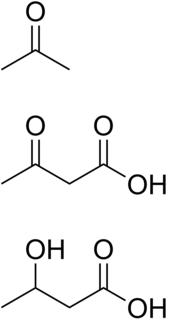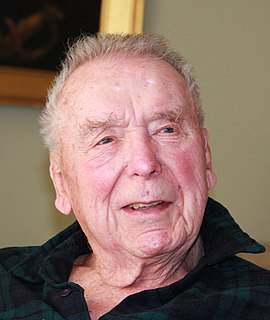Related Research Articles

K2, at 8,611 metres (28,251 ft) above sea level, is the second-highest mountain on Earth, after Mount Everest. It lies in the Karakoram range, partially in the Gilgit-Baltistan region of Pakistan-administered Kashmir and partially in a China-administered territory of the Kashmir region included in the Taxkorgan Tajik Autonomous County of Xinjiang.

Mount Everest is Earth's highest mountain above sea level, located in the Mahalangur Himal sub-range of the Himalayas. The China–Nepal border runs across its summit point. Its elevation of 8,848.86 m (29,031.7 ft) was most recently established in 2020 by the Chinese and Nepali authorities.

Ketosis is a metabolic state characterized by elevated levels of ketone bodies in the blood or urine. Physiological ketosis is a normal response to low glucose availability, such as low-carbohydrate diets or fasting, that provides an additional energy source for the brain in the form of ketones. In physiological ketosis, ketones in the blood are elevated above baseline levels, but the body's acid–base homeostasis is maintained. This contrasts with ketoacidosis, an uncontrolled production of ketones that occurs in pathologic states and causes a metabolic acidosis, which is a medical emergency. Ketoacidosis is most commonly the result of complete insulin deficiency in type 1 diabetes or late-stage type 2 diabetes. Ketone levels can be measured in blood, urine or breath and are generally between 0.5 and 3.0 millimolar (mM) in physiological ketosis, while ketoacidosis may cause blood concentrations greater than 10 mM.

Ancel Benjamin Keys was an American physiologist who studied the influence of diet on health. In particular, he hypothesized that replacing dietary saturated fat with polyunsaturated fat reduces cardiovascular heart disease. Modern dietary recommendations by health organizations, systematic reviews, and national health agencies corroborate this.

The Sherpa are one of the Tibetan ethnic groups native to the most mountainous regions of Nepal, Tingri County in the Tibet Autonomous Region and the Himalayas. The term sherpa or sherwa derives from the Sherpa language words ཤར shar ("east") and པ pa ("people"), which refer to their geographical origin of eastern Tibet.

George Herbert Leigh Mallory was an English mountaineer who took part in the first three British expeditions to Mount Everest in the early 1920s.
Alan Paul Rouse was the first British climber to reach the summit of the second highest mountain in the world, K2, but died on the descent.
High-altitude cerebral edema (HACE) is a medical condition in which the brain swells with fluid because of the physiological effects of traveling to a high altitude. It generally appears in patients who have acute mountain sickness and involves disorientation, lethargy, and nausea among other symptoms. It occurs when the body fails to acclimatize while ascending to a high altitude.
Lincoln Ross Hall OAM was a veteran Australian mountain climber, adventurer, author and philanthropist. Lincoln was part of the first Australian expedition to climb Mount Everest in 1984, which successfully forged a new route. He reached the summit of the mountain on his second attempt in 2006, miraculously surviving the night at 8,700 m (28,543 ft) on descent, after his family was told he had died.

David Sharp was an English mountaineer who died near the summit of Mount Everest. His death caused controversy and debate because he was passed by a number of other climbers heading to and returning from the summit as he was dying, although a number of others tried to help him.

Charles Snead Houston was an American physician, mountaineer, high-altitude investigator, inventor, author, film-maker, and former Peace Corps administrator. He made two important and celebrated attempts to climb the mountain K2 in the Karakoram Range.

The 1996 Mount Everest disaster occurred on 10–11 May 1996 when eight climbers caught in a blizzard died on Mount Everest while attempting to descend from the summit. Over the entire season, 12 people died trying to reach the summit, making it the deadliest season on Mount Everest at the time and the third deadliest after the 22 fatalities resulting from avalanches caused by the April 2015 Nepal earthquake and the 16 fatalities of the 2014 Mount Everest avalanche. The 1996 disaster received widespread publicity and raised questions about the commercialization of Everest.

Fredrik Sträng is a Swedish mountain climber, adventurer and documentary film maker.
The 1936 British Mount Everest expedition was a complete failure, and raised questions concerning the planning of such expeditions. This was Hugh Ruttledge's second expedition as leader. Heavy snows and an early monsoon forced their retreat on several occasions, and on the final attempt two climbers narrowly survived an avalanche. This was the first expedition in which climbers were able to carry portable radios.
Lewis Griffith Cresswell Evans Pugh, generally known as Griffith Pugh, was a British physiologist and mountaineer. He was the expedition physiologist on the 1953 British expedition that made the first ascent of Mount Everest, and a researcher into the effects of cold and altitude on human physiology.

Brianna Stubbs is an elite British rower and research scientist who won two gold medals for Great Britain at the 2013 U23 and 2016 World Rowing Championships. She was the youngest person to row across the English Channel when she completed the feat in 2004, at the age of 12. Her research is focussed on the metabolism of ketone drinks, and has been based at Oxford University. In 2014, she was included in the BBC's 100 Women.
Exogenous ketones are a class of ketone bodies that are ingested using nutritional supplements or foods. This class of ketone bodies refers to the three water-soluble ketones. These ketone bodies are produced by interactions between macronutrient availability such as low glucose and high free fatty acids or hormone signaling such as low insulin and high glucagon/cortisol. Under physiological conditions, ketone concentrations can increase due to starvation, ketogenic diets, or prolonged exercise, leading to ketosis. However, with the introduction of exogenous ketone supplements, it is possible to provide a user with an instant supply of ketones even if the body is not within a state of ketosis before ingestion. However, drinking exogenous ketones will not trigger fat burning like a ketogenic diet.

Mount Everest in 2016 covers events about Mount Everest, the highest mountain on Earth located in Nepal and Chinese Tibet in Asia. It is a popular climbing destination for extreme high altitude climbers, with several hundred climbing each year despite various dangers.
References
- 1 2 "Dr Andrew J Murray". Directory. Department of Physiology, Development and Neuroscience, University of Cambridge. Retrieved 2020-11-13.
- ↑ Pease, Roland (22 May 2017). "Lean-burn physiology gives Sherpas peak-performance". BBC News.
- ↑ Shurkin, Joel (2 July 2014). "Why Do Mountain Climbers Waste Away?". InsideScience.
- ↑ "High-fat diets can make us stupid". Times of India. 5 September 2009.
- 1 2 "Dr. Andrew Murray "Kings of the Mountain: Studies of Extreme Physiology with the Himalayan Sherpas"" (talk announcement with speaker biography). Oxford and Cambridge Society of New England. 19 March 2019. Retrieved 2020-11-13.
- ↑ Cary, Tom (12 July 2020). "London 2012 Olympians used in 'secret project to test experimental substance'". The Telegraph.
- ↑ Cary, Tom (5 July 2020). "Tour de France riders ready to fuel up on ketones – the mysterious energy drink developed at Oxford University". The Telegraph.
- ↑ "Dr Andrew Murray". Evidence-Based Postoperative Medicine. Retrieved 2020-11-13.
- ↑ "Dr Andrew Murray". Fellows and Academics Directory. Trinity Hall, Cambridge. Retrieved 2020-11-13.